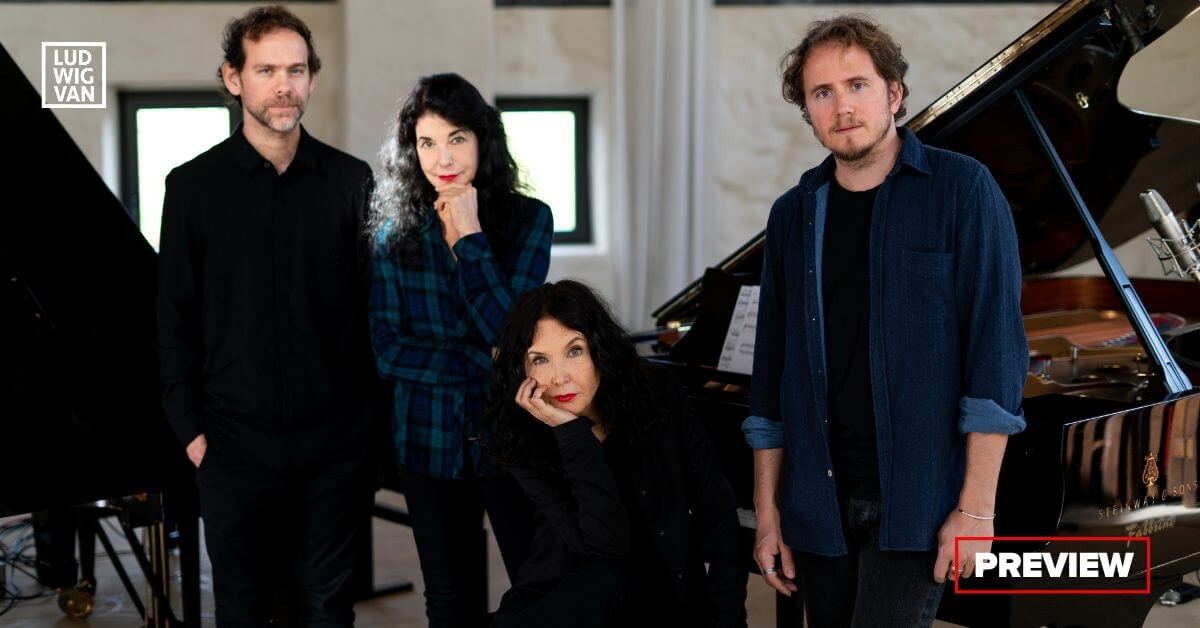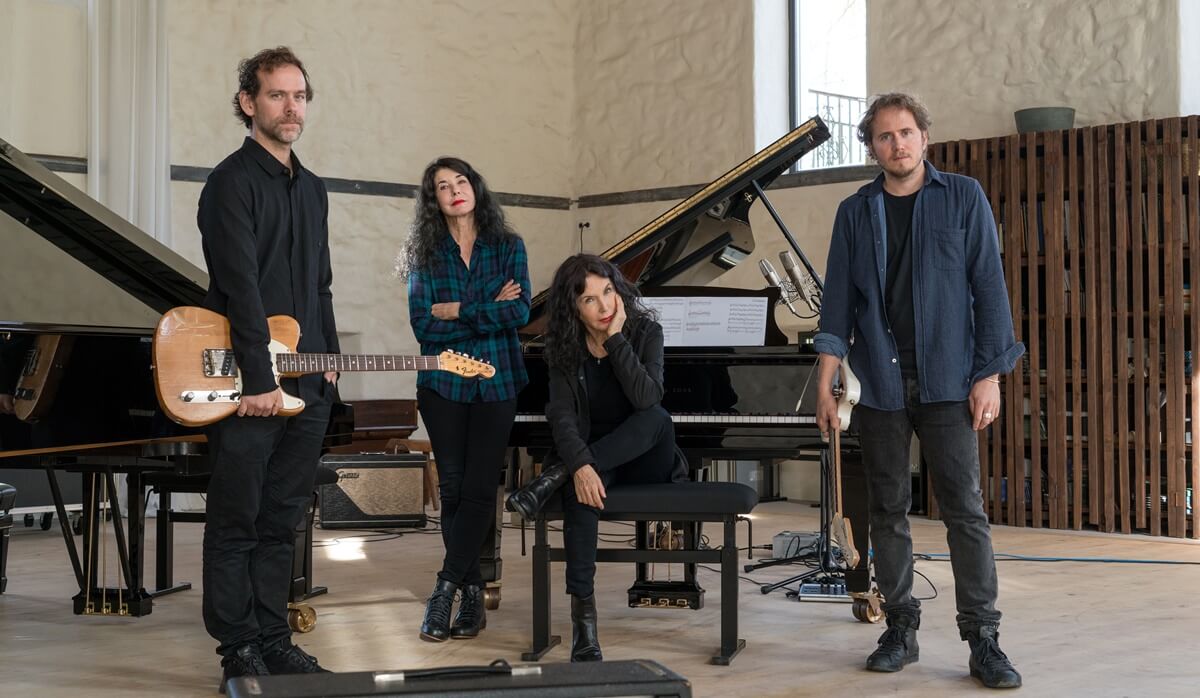
Classical contemporary supergroup The Dream House Quartet will be performing in Toronto at the Meridian Arts Centre on May 3 as part of their North American tour. The quartet comprises pianists Katia and Marielle Labèque, guitarist and composer Bryce Dessner, (best known as founding member of The National), and composer, musician, and producer David Chalmin.
With a unique instrumentation of two pianos and two guitars, they’ll be bringing an eclectic program of new music.
Dream House Quartet
Who are Dream House Quartet?
Siblings Katia and Marielle Labèque have been performing together since childhood, and first rose to fame with a modern take on Gershwin’s classic Rhapsody in Blue, which garnered a gold record designation. They’ve played with major orchestras around the world, and collaborated with prominent composers like Pierre Boulez and Philip Glass, among many others.
Grammy winning artist Bryce Dessner is as much at home in the world of classical music composition as he is in the role of guitarist, arranger and songwriter for the indie alt-rock band The National. His compositions have been commissioned by l’Orchestre de Paris and the Los Angeles Philharmonic, among many others, and he’s written a number of well received film scores.
As a producer, arranger, and sound engineer, David Chalmin has worked with icons of the indie music world. As a composer, his recent piece Electric Fields was co-written with Bryce Dessner for Barbara Hannigan along with the Labèque sisters. The performance at Disney Hall incorporated live video by Netia Jones and live electronics performed by Chalmin.
Dream House Quartet perform Bryce Dessner’s Haven in Paris in 2019:
As guitarist and composer Bryce Dessner tells it, the quartet came together as a natural kind of evolution.
“I’ve been working with Katia and Marielle for several years,” says Bryce Dessner. The group met several years ago during an event with the Los Angeles Philharmonic.
After living in New York City for several years, Dessner moved to France in 2014, where the sibling performers are famous. “I wrote a piece called El Chan which is a two piano piece.” The Labèques have performed the concerto he wrote for them in concert many times. “They’re kind of a second family to me now,” he says. David Chalmin is Katia’s partner. “We all live down here in Basque Country. It’s almost like our band.”
A concert in Paris in 2016 kicked off the ensemble’s performing history, although the group didn’t formally become Dream House Quartet until 2018. Their goal is to bring the classical and contemporary worlds of music together.
In 2019, the quartet toured with the music of British Thom Yorke, best known for his work with Radiohead, but also a composer of music for films and more. That tour began at the Paris Philharmonie, and continue to Lyon, London, and the Hamburg Elb Philharmonie. Yorke composed two pieces for Katia and Marielle, including one they’ll play on the current tour.
The repertoire for Dream House Quartet blends the classical and the contemporary. “I spend my life composing music and playing electric guitar,” he says. In The National, his role is quite different, as he explains. “This is a nice way to kind of marry those things.”
The repertoire
“This particular program is mostly featuring music by David and I.” The tour will include premieres of specific works in some areas. “We’re constantly developing the program.”
The works on the program include new pieces by both Bryce Dessner and David Chalmin, Thom Yorke’s first classical composition Don’t Fear the Light, and music by Philip Glass, Steve Reich, Meredith Monk, Anna Thorvaldsdottir, and others.
“Everything we are playing is either our composition, or what we’ve arranged,” Dessner explains. “We play music we like.”

The works hold special resonance for him. “Electric Counterpoint is one of Steve Reich’s most amazing pieces. It first got me into composition.” The Dream House version incorporates two live guitars, along with pre-recorded elements.
Steve Reich, as Dessner notes, has often worked with double instrumentation. “As a composer, it’s endlessly interesting.” Working with two pianos, it accentuates the percussive nature of the instrument. “It has this kind of one big instrument feel about it.”
“There’s a piece called Haven that kind of epitomizes our sound.” A piece called Cherche le bruit will be premiered — it’s the name of the town where Katia and David live. “It’s much more virtuosic,” Dessner says. “It’s a bit of an homage to Reich.”
On classical music
While the current program focuses on works by Dessner, Chalmin, and longtime favourites, the quartet has broader goals.
“We’ve started commissioning new works,” Dessner says. “When we began, we were combining — it’s obviously all music by living composers — it’s a mix that we like to call historic minimalism.” Although, as he continues, minimalism may be too narrow a term. “It’s almost reductive to call them minimalists.”
The classical music world is still subject to a kind of purist mentality in some quarters which insists on separating it from any other genres. “It removes an elemental, fundamental vitality of the music. We exist in conversation,” he says.
“I think that classical music, while historic, and at least 1,000 years of tradition, if we’re talking about Western music, is a living tradition.” New composers take their inspiration from the same things that the old masters did, he notes.
“We exist in a cross generational continuum.” He notes that classical music canon itself has excluded so many voices from for so long, a matter that’s only now begun to be addressed.
“I think my response to that is, I love Renaissance music, and 12th century polyphony, […] as much as I love Philip Glass and the Beatles.”
Younger listeners, in particular, don’t separate classical music from the array of other genres of music they listen to. It’s one among many choices, and streaming has led to an upward bump in classical music listening overall.
“Any teenager can sit in their bedroom and listen to Mahler’s 5th, and it’s revelatory,” Dessner says.
But, as he points out, the technology can also promote a certain homogeneity that is part of the algorithmic culture. That’s what makes supporting new composers so crucial. “I think it’s important to hear new composers and encourage them.”
And, in some ways, what we now accept as classical canon doesn’t necessarily have historical roots. Improvisation, for instance, was both common and expected of performers during the classical and baroque eras. “The baroque idea of a musician is closer to today’s,” he says.
The details
Their North American tour kicks off in New York City on April 23, and wraps up in New Haven, CT on May 5. They hit Toronto on May 3 at the George Weston Recital Hall.
Just before, their new EP on the Deutsche Grammophon label will be released on April 14.
Tickets for the Toronto show May 3 show are on sale now [HERE].
#LUDWIGVAN
Get the daily arts news straight to your inbox.
Sign up for the Ludwig van Daily — classical music and opera in five minutes or less HERE.
- PREVIEW | SUMMER OPERA LYRIC THEATRE Presents Handel’s Xerxes, Mozart’s Idomeneo & Puccini’a La Boheme July 26 To August 4 - July 26, 2024
- PREVIEW | YENSA Festival V.2 Offers Black Flames Performances & Other Ways To Celebrate Black Women In Dance - July 25, 2024
- PREVIEW | Canadian Talent Conspicuous In The Met: Live In HD 2024-25 Season - July 25, 2024



